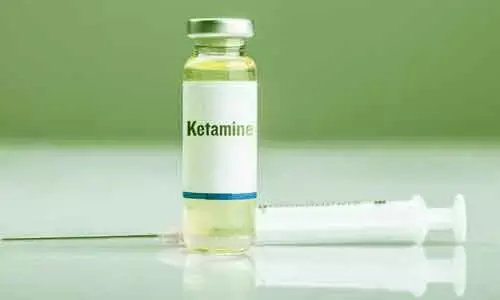- Home
- Medical news & Guidelines
- Anesthesiology
- Cardiology and CTVS
- Critical Care
- Dentistry
- Dermatology
- Diabetes and Endocrinology
- ENT
- Gastroenterology
- Medicine
- Nephrology
- Neurology
- Obstretics-Gynaecology
- Oncology
- Ophthalmology
- Orthopaedics
- Pediatrics-Neonatology
- Psychiatry
- Pulmonology
- Radiology
- Surgery
- Urology
- Laboratory Medicine
- Diet
- Nursing
- Paramedical
- Physiotherapy
- Health news
- Fact Check
- Bone Health Fact Check
- Brain Health Fact Check
- Cancer Related Fact Check
- Child Care Fact Check
- Dental and oral health fact check
- Diabetes and metabolic health fact check
- Diet and Nutrition Fact Check
- Eye and ENT Care Fact Check
- Fitness fact check
- Gut health fact check
- Heart health fact check
- Kidney health fact check
- Medical education fact check
- Men's health fact check
- Respiratory fact check
- Skin and hair care fact check
- Vaccine and Immunization fact check
- Women's health fact check
- AYUSH
- State News
- Andaman and Nicobar Islands
- Andhra Pradesh
- Arunachal Pradesh
- Assam
- Bihar
- Chandigarh
- Chattisgarh
- Dadra and Nagar Haveli
- Daman and Diu
- Delhi
- Goa
- Gujarat
- Haryana
- Himachal Pradesh
- Jammu & Kashmir
- Jharkhand
- Karnataka
- Kerala
- Ladakh
- Lakshadweep
- Madhya Pradesh
- Maharashtra
- Manipur
- Meghalaya
- Mizoram
- Nagaland
- Odisha
- Puducherry
- Punjab
- Rajasthan
- Sikkim
- Tamil Nadu
- Telangana
- Tripura
- Uttar Pradesh
- Uttrakhand
- West Bengal
- Medical Education
- Industry
Treatment-resistant depression improves with ketamine infusion: JAMA

USA: According to a report published in JAMA Psychiatry, when treatment-resistant depression patients were compared to healthy controls, belief updating was more positive and depression lessened as fast as 4 hours after the initial ketamine infusion.
A significant public health issue, major depressive disorder (MDD) and bipolar depression are characterized by a variety of unfavorable beliefs, such as worthlessness, hopelessness, and pessimism. Ketamine has a fast antidepressant effect that peaks within 24 hours, according to several meta-analyses of placebo-controlled randomized clinical trials. Despite these encouraging findings, little is understood about how ketamine's cognitive effects on TRD patients and their connection to clinical improvement.
Ketamine disrupts the belief-updating process by altering how individuals update their views in response to new information, according to pharmacological investigations on healthy participants, the authors claimed.
The researchers examined whether ketamine affects belief updating as well as how these cognitive effects relate to ketamine's therapeutic effects.
For this purpose, the mixed-effects design of the observational case-control study stratified two groups by two testing time points. There were 56 participants in all (52% men, mean age 52.3), including 30 healthy volunteers and 26 people with treatment-resistant depression (TRD). A major depressive disorder or bipolar disorder diagnosis, a Montgomery-Sberg Depression Rating Scale (MADRS) score of 20 or higher, a Maudsley Staging Method score of 7 or higher, and at least two prior antidepressant trials that were unsuccessful were required for inclusion in the depression group. A week following the first infusion of ketamine, the third infusion was observed in the depression group 24 hours before the first infusion, 4 hours after the first infusion, and then 4 hours after the third infusion. Participants in the healthy control group underwent two separate, ketamine-free observations one week apart.
The main outcome was assessed by a cognitive belief-updating task and then analytically defined by a computational reinforcement learning model as the MADRS score and belief updating following belief updating when patients got good news and negative news. Data was gathered in January-February 2019 and May-December 2019 before being examined during January-July 2020.
Key highlights of the study:
- After a single ketamine infusion, those with TRD revised their views more frequently (adjusted for age and education: =0.91; 95% CI, 1.58 to 0.24; t216=2.67) than controls.
- Four hours after the ketamine infusion, there was a quick and noticeable decline in MADRS ratings as a result of treatment.
- Asymmetrical learning rates (LRs) after ketamine treatment were linked to this effect, according to computational modeling (good news LRs after ketamine, 0.51 [SEM, 0.04]; bad news LRs after ketamine, 0.36 [SEM, 0.03], t25=3.8). This effect also partially mediated initial antidepressant responses (path a*b: =1.00 [SEM, 0.66]; t26=1.53; z=1.98).
The findings supported earlier studies showing that ketamine caused a quick and long-lasting reduction in depressive symptoms.
The study offers unique notions of the cognitive mechanisms underlying ketamine's therapeutic effects in patients with TRD and offer bright prospects for augmented psychotherapy for people suffering from mood disorders, concluded the authors.
REFERENCE
Bottemanne H, Morlaas O, Claret A, Sharot T, Fossati P, Schmidt L. Evaluation of Early Ketamine Effects on Belief-Updating Biases in Patients With Treatment-Resistant Depression. JAMA Psychiatry. Published online September 28, 2022. doi:10.1001/jamapsychiatry.2022.2996
Dr Kamal Kant Kohli-MBBS, DTCD- a chest specialist with more than 30 years of practice and a flair for writing clinical articles, Dr Kamal Kant Kohli joined Medical Dialogues as a Chief Editor of Medical News. Besides writing articles, as an editor, he proofreads and verifies all the medical content published on Medical Dialogues including those coming from journals, studies,medical conferences,guidelines etc. Email: drkohli@medicaldialogues.in. Contact no. 011-43720751


